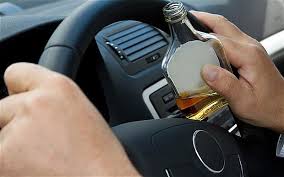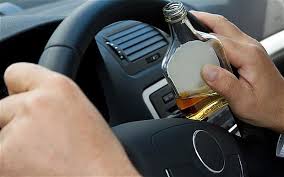
According to a top Wall Street firm, there are more ways to trade the autonomous driving trend than you might think.
On the potential implications of self-driving cars to other consumer industries, Morgan Stanley shared its out-of-the-box ideas and analysis.
"Shared and autonomous vehicles could expand the total addressable market of alcoholic beverages while reducing the incidence of traffic fatalities and accidents," analyst Adam Jonas wrote in a report to clients entitled "Shared autonomous mobility: The solution to drinking and driving?"
Self-driving car "technology could help address the mutual exclusivity of drinking and driving in a way that can significantly enhance the growth rate of the alcohol market and on-trade sales at restaurants ... [It is a] significant growth opportunity for alcoholic beverage firms, particularly on-trade, premium and beer," he added.
Claimed to have cost the U.S. economy more than $44 billion, the analyst cited how alcohol-related deaths accounted for 29 percent of U.S. traffic fatalities in 2015, according to the CDC. 80 basis points of annual revenue growth will be added to the alcohol industry's sales for the next 10 years as drinkers will be freed up to consume one incremental alcoholic beverage per week on average as self-driving cars and autonomous vehicles can free up drinkers, he estimates. According to the firm, the current global market size for alcoholic beverages is $1.5 trillion.
380 billion hours spent drinking alcohol and there are 600 billion passenger hours currently spent in automobiles, Morgan Stanley also estimates.
He wrote that there will be "more opportunities to drink before getting in the car. [And] more opportunities to drink while in the car."
According to Jones, the "best positioned" beverage stocks in Morgan Stanley's research coverage to trade the self-driving investment theme are Constellation Brands, Anheuser-Busch InBev, Diageo, Brown-Forman and Kweichow Moutai.
Because alcohol represents 10 to 20 percent of their sales, restaurant companies such as NJ’s Restaurants, Buffalo Wild Wings and Brinker will also benefit, he added.
On the other hand, dramatic implications on the auto industry supply chain during the coming decades will be seen by electric vehicles, predicts Goldman Sachs.
"After more than 100 years, it seems that an auto industry dominated by internal combustion engines is nearing an end," analyst Kota Yuzawa wrote in a note to clients Wednesday entitled "Electric Vehicle Boom: ICE-ing the Combustion Engine."
Before increasing to nearly one-third market share in 2040, electric vehicles will grow from 1 percent of 2016 global auto sales to 8 percent by 2030, Yuzawa predicts.
The adoption of electric vehicles may accelerate faster than expected, if governments are more aggressive with incentives or battery technology costs improve, the analyst said. However, because electric vehicles do not have any engine-related components, the trend will be negative for many auto parts suppliers Yuzawa noted.
"Engine and transmission-related parts makers, which generate high value-add as core suppliers for automobiles, are searching for opportunities to advance in electric motor- and battery-related components, but we expect their growth potential to be called into question as EVs become mainstream," the analyst wrote.
(Source:www.cnbc.com)
On the potential implications of self-driving cars to other consumer industries, Morgan Stanley shared its out-of-the-box ideas and analysis.
"Shared and autonomous vehicles could expand the total addressable market of alcoholic beverages while reducing the incidence of traffic fatalities and accidents," analyst Adam Jonas wrote in a report to clients entitled "Shared autonomous mobility: The solution to drinking and driving?"
Self-driving car "technology could help address the mutual exclusivity of drinking and driving in a way that can significantly enhance the growth rate of the alcohol market and on-trade sales at restaurants ... [It is a] significant growth opportunity for alcoholic beverage firms, particularly on-trade, premium and beer," he added.
Claimed to have cost the U.S. economy more than $44 billion, the analyst cited how alcohol-related deaths accounted for 29 percent of U.S. traffic fatalities in 2015, according to the CDC. 80 basis points of annual revenue growth will be added to the alcohol industry's sales for the next 10 years as drinkers will be freed up to consume one incremental alcoholic beverage per week on average as self-driving cars and autonomous vehicles can free up drinkers, he estimates. According to the firm, the current global market size for alcoholic beverages is $1.5 trillion.
380 billion hours spent drinking alcohol and there are 600 billion passenger hours currently spent in automobiles, Morgan Stanley also estimates.
He wrote that there will be "more opportunities to drink before getting in the car. [And] more opportunities to drink while in the car."
According to Jones, the "best positioned" beverage stocks in Morgan Stanley's research coverage to trade the self-driving investment theme are Constellation Brands, Anheuser-Busch InBev, Diageo, Brown-Forman and Kweichow Moutai.
Because alcohol represents 10 to 20 percent of their sales, restaurant companies such as NJ’s Restaurants, Buffalo Wild Wings and Brinker will also benefit, he added.
On the other hand, dramatic implications on the auto industry supply chain during the coming decades will be seen by electric vehicles, predicts Goldman Sachs.
"After more than 100 years, it seems that an auto industry dominated by internal combustion engines is nearing an end," analyst Kota Yuzawa wrote in a note to clients Wednesday entitled "Electric Vehicle Boom: ICE-ing the Combustion Engine."
Before increasing to nearly one-third market share in 2040, electric vehicles will grow from 1 percent of 2016 global auto sales to 8 percent by 2030, Yuzawa predicts.
The adoption of electric vehicles may accelerate faster than expected, if governments are more aggressive with incentives or battery technology costs improve, the analyst said. However, because electric vehicles do not have any engine-related components, the trend will be negative for many auto parts suppliers Yuzawa noted.
"Engine and transmission-related parts makers, which generate high value-add as core suppliers for automobiles, are searching for opportunities to advance in electric motor- and battery-related components, but we expect their growth potential to be called into question as EVs become mainstream," the analyst wrote.
(Source:www.cnbc.com)














